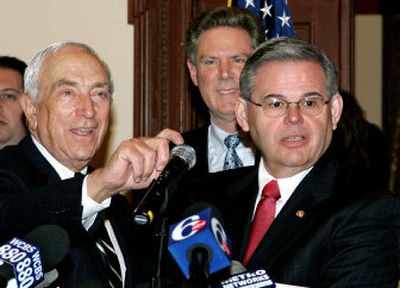Medicare agrees to help states in cost from glitch

WASHINGTON – Under mounting pressure from members of Congress and state officials, the federal government on Tuesday agreed to help repay states that stepped in to buy prescription drugs for poor seniors whose coverage failed under the beleaguered Medicare prescription drug benefit.
While the private drug plans that administer the Medicare benefit will repay the bulk of states’ costs, Medicare will compensate states for any potential shortfall in the reimbursements, said Health and Human Services Secretary Michael Leavitt. In addition, Medicare will refund states for any costs incurred in providing the medications.
Officials at Medicare said it’s unclear how much the new commitments would cost.
The move, which received mixed reviews, is the latest attempt by Medicare officials to iron out a myriad of problems that have dogged the new drug benefit since it began on Jan. 1.
A series of computer and phone glitches, incomplete enrollment data and human errors left hundreds of thousands of Medicare recipients without drug coverage when their insurance under Medicaid – the state and federal health plan for the poor – switched on Jan. 1 to Medicare.
As a result, some of Medicare’s most frail patients with high rates of disability, chronic disease and cognitive impairments were unable to get their regular medications. Some were placed in drug plans that didn’t cover their medicines, and others left pharmacies empty-handed after being incorrectly charged high out-of-pocket fees.
About 20 states agreed to purchase the medications through Medicaid until the problems with Medicare were resolved. The expenditures have since grown into the hundreds of millions of dollars, with California alone expected to spend $150 million on the effort.
After Medicare officials said states would have to recoup the money from the drug plans, members of Congress stepped up the pressure for Medicare to pay the states directly. Sen. Frank Lautenberg, D-N.J., said recently that he would introduce such a bill. In the House of Representatives, Rep. Jeb Bradley, R-N.H., said he would introduce legislation that gives the federal government the authority to reimburse states.
But Medicare administrator Mark McClellan said his agency’s proposed solution is the better choice.
“This can start right away. We don’t need legislation,” McClellan said.
To get the federal assistance money, states must agree to work through Medicare to recoup their money from the drug plans. By Feb. 15, federal officials expect that participating states would no longer be making emergency drug purchases.
“We expect the states to work with us and agree to turn off their Medicaid reimbursement systems and return to the Medicare system by Feb. 15. But we may be able to extend that date for certain specific states,” McClellan said.
In an e-mail message from Iraq where he’s visiting troops, Arkansas Gov. Mike Huckabee, chairman of the National Governors Association and a Republican, said he met with Leavitt on Saturday in Little Rock, Ark., and was assured that federal help was near.
But Lautenberg said the federal offer was no solution, only “more red tape from the Bush administration.”
“If anything, today’s announcement only makes the problem worse,” he said. “First, states had to step in and spend millions to prevent the Medicare system from collapsing at the beginning of this year. Now the federal government wants the states to act as its bill collectors.”
Bradley, who hadn’t had a chance to see details of the plan, said it “sounds reasonable,” but he too was concerned, specifically how billing disputes would be resolved. Bradley said he wants Medicare to be responsible for going after the money. “States shouldn’t have to go back and negotiate with the drug plans.”
McClellan ensured that Medicare would deal with the drug plans.